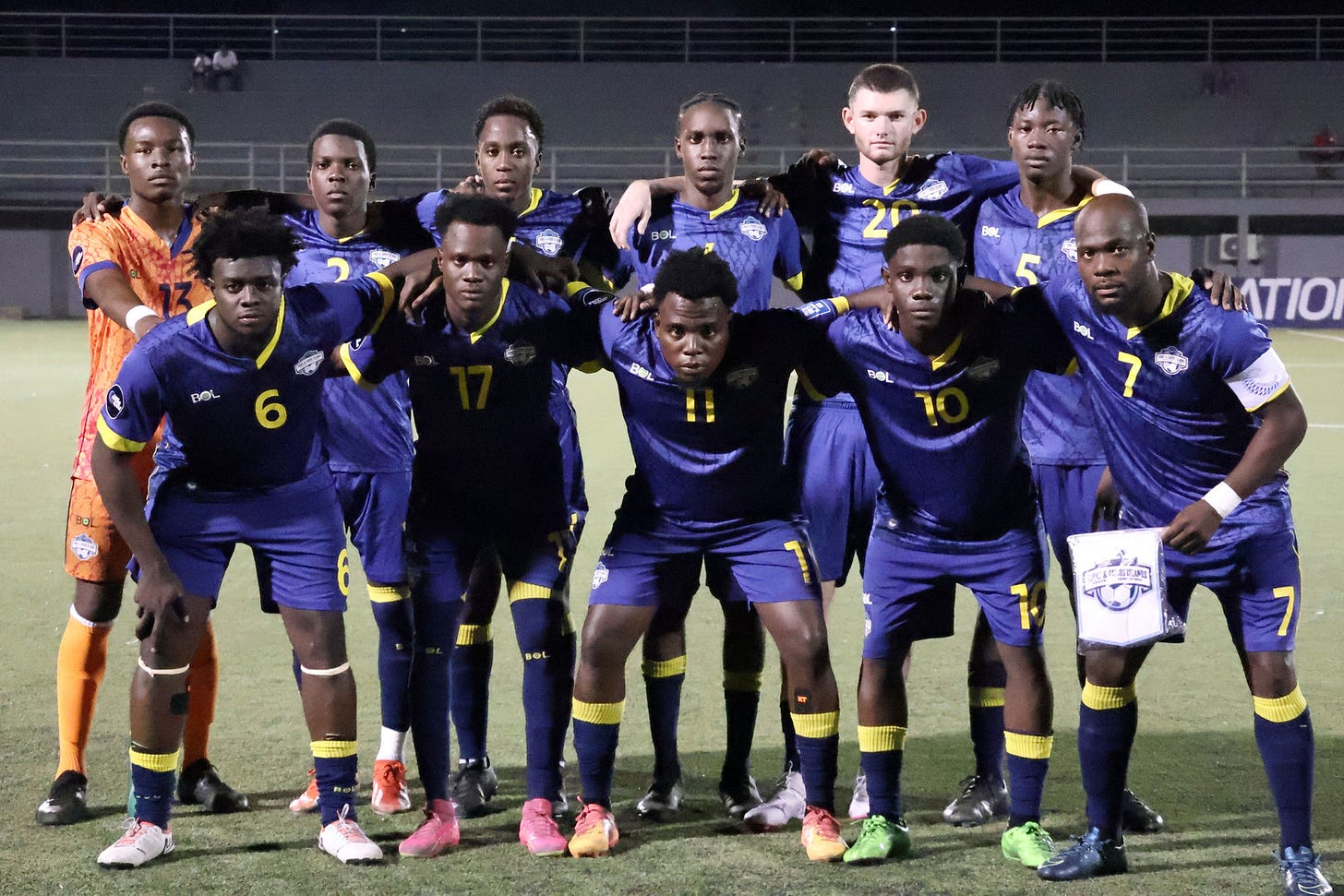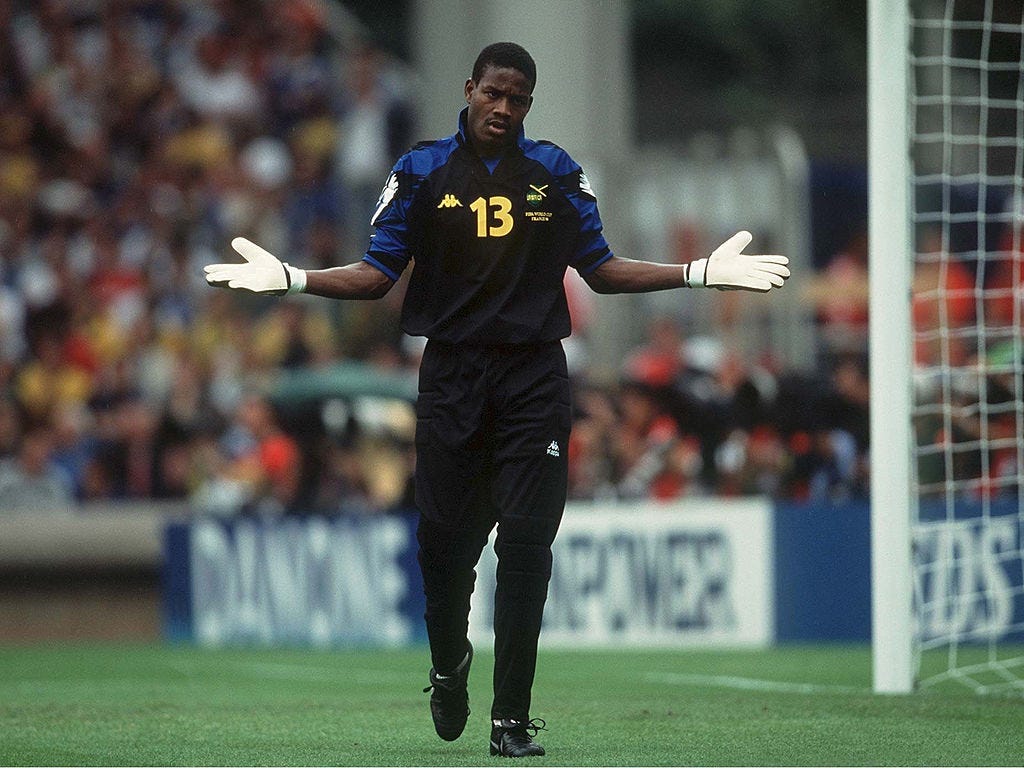🌴 Teenage goalkeepers in Caribbean redefining stereotypes as they win No. 1 jobs
Old bald guys are on alert as younger shot-stoppers stake their claims.
Getting CONCACAFed tells stories from soccer’s most fun region. From the United States to Aruba, Mexico to the Cayman Islands, I look for interesting tales and trends you won’t read about anywhere else.
Support the newsletter by signing up for the free list or chipping in $50 for a premium membership, which comes with more than 50 exclusive newsletters a year.
Aaron Lawrence’s goalkeepers know him as ‘Coach’, and that’s how he wants to keep it. But, inevitably, they’ll punch his name into Google or hear from a relative that he’s much more widely known as ‘Wildboy’.
It’s a name he earned with the Jamaica national team, earning 72 caps with the Reggae Boyz between 1997-2005. He backstopped Jamaica to its only World Cup win, a 2-1 triumph over Japan in 1998.
Now the manager of the Turks and Caicos Islands, Lawrence has opted for a gambit many see as a wild one. In the September international window, he started a goalkeeper who was 14, Samuel Harvey, and in October he went with Peterson Saint Fleurant, who is 17.
His reasoning is that they’re the best goalkeepers he has. They’ve trained with him as shot-stoppers, they work hard and the biggest thing for him? They’re ready.

“I never think of them as young goalkeepers. I just think of them as a regular goalkeeper who could do the job,” Lawrence told me last week. “I needed someone to do the job, and I think they’ve reached the level where they could do well for us, give us an opportunity to win games and give themselves a chance to prove to the world that they’re here and ready for the big time.”
Lawrence isn’t alone.
There is a boom of young No. 1s sweeping the Caribbean, forcing a rethink of stereotypes about what a starting goalkeeper for a national team looks like and when players are ready to assume the top role.
In the October window, seven of nine teams in League C started a goalkeeper 26 years of age or younger in Concacaf Nations League play. Seven of the League C teams called at least one teenage goalkeeper to the squad.
While they’re not betting on players as young as the ones Lawrence is, even some top teams in the region find themselves in the midst of a goalkeeping youth movement. Costa Rica’s successor to Keylor Navas is 25-year-old Patrick Sequeira, while 27-year-old Luis Malagon looks set to surpass Guillermo Ochoa as Mexico’s regular starter.
Gone are the days of a bald goalkeeper in his 40s racking up caps as he continues to hang on to the starting spot. Managers are increasingly willing to give opportunities to younger goalkeepers.
Nowhere is that more evident than in the Caribbean.
For their October matches against Montserrat, Bonaire relied on a goalkeeper more than 20 year older than typical starter Denyor Cicilia since the Netherlands-based teenager had other obligations.
“I’m in my exam year, the last year of (secondary) school,” Cicilia, the 17-year-old who has a half-dozen starts as Bonaire’s goalkeeper, told me this week. “Last year they were more flexible, but this year they’re more careful about letting me go. I have to finish school and get my diploma.”
Currently with NEC Nijmegen’s U-19 team, Cicilia’s mom called him last summer and said the Bonaire federation had been in touch about an international call-up. He assumed it was for the youth team but ended up getting a senior shot not long after committing to the team.
When he returned to Nijmegen, friends and teammates couldn’t believe they could pull up the match on YouTube and see their friend in senior international matches - a pair of wins over Anguilla. Now, they ask to come with him to get out of the cold of the European winter. Some are investigating their own potential pathways to represent Bonaire or other Dutch Caribbean teams.
After that 2023 debut, Cicilia had an international breakout match in March 2024 when Bonaire played a friendly against El Salvador at Audi Field in Washington D.C. The Caribbean squad was able to secure a draw thanks to Cicilia’s strong showing in goal, plus a mistake from La Selecta that allowed Bonaire to score.
With this round of exams out of the way, Cicilia is preparing for this month’s trip to El Salvador where Bonaire again meets La Selecta and St. Vincent and the Grenadines with League B survival on the line.
It’s a lot to take on for a player who is yet to make his professional debut, but Cicilia said a loan stint with Huesca last season helped him become more mature and have a healthy outlook on being such an influential player on a team backed by around 25,000 Bonaireans.
“I try not to think about the responsibilities and pressure on me. Even though I’m young, it’s a great gift. It’s not a chance everyone gets,” he said. “I try to honor that, enjoy the moment and be happy.”
Lachlin Lambert waited more than a year for his chance, laughing after saying he “finally” got a start for the Cayman Islands senior team when he was 17. By that time, Lambert already had been involved with the Caymans’ youth teams for some time.
A year later, Lambert not only has become the regular starter but is a leader for the young team.
“You have to be a leader in the group. We had a trip to Turkey (in March) and played teams like Moldova,” Lambert tells me. “I was named the captain, and I’m close with all the guys. I think being a leader as a goalie is super important.”
Part of that is thanks to the overall youth of the Cayman Islands team. The latest call-up featured just one player over 30 and one other over the age of 26.
After spending the last several years at a boarding school with a soccer academy in the U.S., Lambert now is preparing to sign with an English club. He hopes he’ll continue to be judged on what he can do on the field, not for his youth.
“I think it’s great younger keepers are finally starting to break through because skill-wise they could be better or as good as an older keeper and will have more time to develop,” he said.
Time can be a blessing for young players getting better, but it isn’t always positive. One reason many of the Caribbean nations are turning to younger players all over the field is because of players burning out.
With many countries having only minimal league structures, chances to go to universities in the United States, Canada or the United Kingdom often are some of the only pathways to keep players involved.
While legendary Caribbean goalkeepers like Shaka Hislop of Trinidad and Tobago or current Jamaica starter Andre Blake didn’t start as young as the current crop of Caribbean keepers, their longevity came in part because of their time with U.S. universities that put them on the radar of professional scouts.
“We’re looking for opportunity for them to continue the work. In the Caribbean, what happens when they start to play in school leagues but then go and have to work? They don’t want to play any more,” Lawrence said. “You can’t find them. We’re trying to put them into systems where they can continue to grow, develop and continue with their school life. These are the things we have to do to keep them working and involved.
“We want them to continue in the program so in the next five years or so, you see a better Turks Islands team. We’re in a rebuilding process where some of the older players have gone. We have to build a program with these younger ones.”
For now, he’ll continue to put the young players he feels are prepared into positions where they can succeed.
The word is getting out in the region that the youth can handle the pressure. It’s also getting out that Lawrence had a pretty decent career himself.

“It’s awesome because kids will come back with their phone and say, ‘Coach, coach! I never knew you were famous!’” he said. “‘I never knew you went to the World Cup! Look at coach making the saves!’
“I say, ‘You know, you can be famous too if you put in the work. This is how we need to grow our kids in the Caribbean.”






Absolutely loved this piece! I didn't even realize this many kids had been involved across the Caribbean. It's a great story to tell!